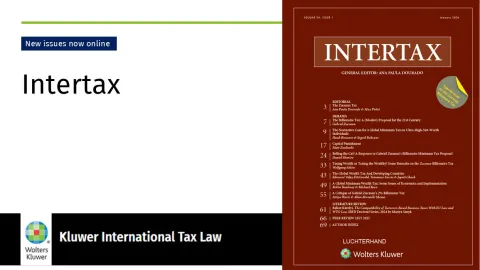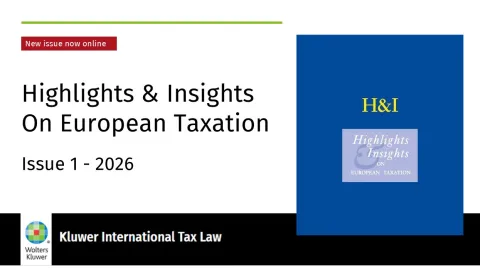The reference for a preliminary ruling on the compatibility of the UTPR with primary EU law and customary international law: a comment
September 10, 2025
On 17 July 2025 the Belgian Constitutional Court requested a preliminary ruling from the Court of Justice of the European Union (CJEU) regarding the compatibility, and by extension the validity, of the Undertaxed Profits Rule provisions in the Pillar 2 Directive2 (the UTPR provisions) with primary EU law and customary international law.3 In particular, the CJEU is requested to answer the question whether the UTPR provisions are compatible with the principle of equality and non-discrimination (Articles 20 and 21 EU Charter), the right to property (Article 17 EU Charter), the freedom to conduct a business (Articles 15 and 16 EU Charter), the freedom of establishment (Article 49 TFEU), the free movement of services (Article 56 TFEU), the principle of legal certainty and the principle of fiscal territoriality as recognized by the CJEU and in customary international law.
In anticipation of a ruling by the CJEU on the reference made by the Belgian Constitutional Court, the question arises as to what legal consequences, in addition to political consequences, a ruling of incompatibility and invalidity of the UTPR provisions may have for EU Member States. This question will be addressed below. What is also addressed below, is the seemingly not unimportant question whether the introduction of a side-by-side system, as announced on 28 June 2025, may affect the likelihood of a decision being rendered on the reference for a preliminary ruling. The latter question is raised because the admissibility of having the American Free Enterprise Chamber of Commerce ("AFECC") initiate proceedings before the Belgian Constitutional Court was based on the fact that the UTPR may apply to group entities established in Belgium that are part of U.S. groups,4which entities would have to be exempt from the UTPR if they were part of a "U.S. parented group".5
The legal consequences of the (hypothetical) invalidity of the UTPR provisions for the EU Member States
If it were assumed that the CJEU were to declare the UTPR provisions invalid, the starting point would be that the TFEU does not address the consequences thereof.6The invalidity of the UTPR provisions would, nevertheless, seem to imply that those provisions would no longer be binding, as to the result to be achieved, on the EU Member States. As such, after an invalidation of the UTPR provisions, there would no longer be an obligation to implement the UTPR provisions into national law.7
For EU Member States, the UTPR provisions would seem to have been implemented into national law at the time the CJEU were to rule on the compatibility and validity of the UTPR provisions, considering their obligation to bring into force the laws necessary to comply with the UTPR provisions of the Pillar 2 Directive by 23 December 2023 (with it being understood that the UTPR provisions shall only be applied in respect of fiscal years beginning from 31 December 2024).8 Consequently, the invalidity of the UTPR provisions would have to raise the question as to what effect such invalidity would have on the national law implementing the UTPR provisions. The starting point in answering this question would seem to be that the CJEU has held that it is up to the EU Member States to decide what consequences the declaration that a directive is invalid would have in their legal systems.9As such, the invalidation of the UTPR provisions would not, as a matter of EU law, in and of itself – or per se – result in national implementation legislation also being declared invalid.10Whether that consequence would arise thus seems dependent on the impact the invalidity of the UTPR provisions would have in the legal systems of a relevant EU Member State.11
Whereas the validity of national implementation legislation is to be determined on the basis of the legal system of an EU Member State, that is not necessarily the case for the applicability of such national implementation legislation. This can be illustrated as follows. If the invalidity (or annulment) of a directive would be based on a conflict with provisions of the EU Treaties that are directed at EU institutions, such as a violation of a procedural requirement provided for in the EU Treaties, such conflict would not also seem to entail that (the application of) national implementation legislation would also conflict with the EU Treaties; the consequences of the invalidity on the applicability of the national implementation legislation would then be left to the EU Member States. 12If, however, the invalidity of directive provisions would be based on a conflict with provisions of the EU Treaties that are (also) addressed to the EU Member States, such as, for example, the freedom of establishment or the EU Charter, national legislation implementing those directive provisions would then also conflict with such provisions of the EU Treaties.13In that case, the primacy of EU law would seem to require that the applicability of the national implementation legislation would be affected in the sense that EU Member State courts would be required to set such national implementation legislation aside. Such inapplicability then would not be based on the invalidity of the directive provisions itself, but on the fact that such national implementation legislation conflicts with primary EU law that takes precedence over the national legislation of the EU Member States.14
If it were assumed that the CJEU were to declare the UTPR provisions invalid, it follows from the above that the grounds on which such invalidity would be based, would be relevant. If these grounds would relate to the incompatibility of the UTPR provisions with the sources of primary EU law referred to in the reference for a preliminary ruling, it would seem that such incompatibility – and not the invalidity itself – entails that the national legislation implementing the UTPR provisions would also have to be incompatible with those sources of EU law. Based on the primacy of such sources of primary EU law, the national implementation legislation would then have to be set aside.15In the reference for a preliminary ruling, the validity of the UTPR provisions is also challenged on the basis of customary international law (i.e., the principle of fiscal territoriality). If it were assumed that the invalidity of the UTPR provisions would be based on such provisions being incompatible with customary international law, such incompatibility would not necessarily seem to result in the inapplicability of the national implementing legislation as a matter of EU law. This is because the primacy of EU law would not extend to customary international law. Consequently, it would seem that the consequences of an invalidation of the UTPR provisions on the basis of an incompatibility with customary international law on national implementation legislation would be dependent on the legal systems of the EU Member States and the hierarchy within those systems between national legislation and customary international law.
The effect of the side-by-side system on the likelihood of a decision on the reference for a preliminary ruling
The proceedings before the Belgian Constitutional Court were initiated by the American Free Enterprise Chamber of Commerce ("AFECC").16The interest of the AFECC with respect to these proceedings, which resulted in the admissibility of the proceedings, was that the AFECC is defending the collective interest of U.S. corporations and government agencies, which collective interest could, according to the Belgian Constitutional Court, be directly and adversely affected by the UTPR insofar as the UTPR may apply to group entities established in Belgium that are part of U.S. groups and thereby affect the interests of U.S. corporations.17Taking into account this collective interest, the introduction of the side-by-side system, as announced on 28 June 2025, would seem relevant, because this system is envisaged to result in "U.S. parented groups" being exempted from the IIR and the UTPR.18
The scope of such relevance would seem dependent on the interpretation of the scope of the collective interest being defended by the AFECC, i.e., whether the collective interest could also be regarded as encompassing U.S. subsidiaries of non-U.S. parented groups, as well as the scope of the exemption from the UTPR, i.e., whether it would also extend to U.S. subsidiaries of non-U.S. parented groups. If it were assumed that the scope of the collective interest of the AFECC is limited to U.S. parented groups, it would seem that such collective interest would no longer be directly and adversely affected by (the Belgian implementation legislation of) the UTPR provisions if the side-by-side system’s exemption from the UTPR for U.S. parented groups were to be introduced and implemented with retroactive effect. If, by contrast, it were assumed that the collective interest also includes U.S. subsidiaries of non-U.S. parented groups and assuming that the scope of the side-by-side system’s would be limited to U.S. parented groups only, such collective interest would still seem to exist after the introduction and implementation of the side-by-side system as U.S. subsidiaries of such groups could still be directly and adversely affected by the (Belgian implementation legislation of) UTPR provisions.
If it were assumed that the introduction and (retroactive) implementation of the side-by-side system would affect the collective interest of the AFECC with respect to the proceedings before the Belgian Constitutional Court, the question that would seem to arise is whether this could have consequences for the proceedings before the Belgian Constitutional Court in terms of the admissibility of the present proceedings or the reference for a preliminary ruling itself (as it is possible for the Belgian Constitutional Court to withdraw would have the possibility to withdraw a reference for a preliminary ruling).19Another, related, question seems to be whether, apart from any consequences being attached to the implementation by the Belgian Constitutional Court, the CJEU could attach consequences to the introduction (and retroactive) implementation of the side-by-side system’s exemption from the UTPR for the admissibility of the reference for a preliminary ruling in terms of the need to proceed to judgment.
The starting point in this respect would be that the reference for a preliminary ruling enjoys a ‘presumption of relevance’ and should, therefore, be ruled upon by the CJEU.20 Nevertheless, the CJEU may refuse to answer the questions in a reference for a preliminary ruling concerning the validity of a directive (i) if it is quite obvious that the interpretation sought bears no relation to the actual facts of the main action or its purpose, (ii) if the problem is hypothetical, or (iii) where the Court does not have before it the factual or legal material necessary to give a useful answer to the question submitted to it.21 The underlying idea of these grounds for refusal seems to be that that the aim of the preliminary ruling procedure provided for by Article 267 TFEU is to assist national courts in rendering judgment by providing them with a ruling that is necessary for the effective resolution of a dispute.22 In light of this aim, the CJEU does not have jurisdiction to issue advisory opinions on questions of a general or hypothetical nature that would not have an effect on the resolution of such a dispute.23 With respect to determining whether the CJEU has such jurisdiction, it may examine, if need be, the circumstances in which a case has been referred to the CJEU, and in particular whether the reference for a preliminary ruling “bears any relation to the actual nature and subject-matter of the main proceedings, in order that the Court will not be required to give opinions on general or hypothetical questions.”24 Within the context of making such an examination, it seems that it cannot be ruled out that the CJEU would take into account developments occurring after the request for a preliminary ruling was made in order to assess whether the request is still relevant,25 or whether such developments would render the request for a preliminary ruling devoid of purpose because it has become purely hypothetical.26 If it were to follow from the examination of the circumstances in which a case has been referred that the questions raised would be “manifestly irrelevant” for the purposes of deciding the proceedings before a national court, the CJEU would have to declare that there is no need to proceed to judgment and, consequently, would not answer the questions raised.27
Taking the above into account and assuming that the introduction and (retroactive) implementation of the side-by-side system were to entail that the collective interest of the AFECC could no longer be directly and adversely affected by the UTPR provisions, it seems that it cannot be ruled out that the CJEU could characterize the reference for a preliminary ruling as having become (purely) hypothetical (with it being assumed in this context that the (retroactive) implementation takes place prior to the CJEU examining its own jurisdiction).28If the reference for a preliminary ruling were to be considered as (purely) hypothetical, this could then provide the CJEU with a ground for refusing to rule on the questions in the reference for a preliminary ruling.29As such, it seems conceivable that the introduction and (retroactive) implementation of the side-by-side system, if such implementation were to occur prior to a judgment by the CJEU, could prevent the CJEU from rendering a judgment on the reference for a preliminary ruling by the Belgian Constitutional Court.
- 1This comment is based on a Dutch case comment to the judgment of the Belgian Constitutional Court, as published in NLF 2025/1634.
- 2Council Directive (EU) 2022/2523 of 14 December 2022 on ensuring a global minimum level of taxation for multinational enterprise groups and large-scale domestic groups in the Union.
- 3See https://www.const-court.be/public/n/2025/2025-104n.pdf
- 4See para. B.2.2.
- 5See U.S. Treasury, G7 Statement on Global Minimum Tax ( https://home.treasury.gov/news/press-releases/sb0181 ) (‘set out a proposed 'side-by-side' solution under which U.S. parented groups would be exempt from the Income Inclusion Rule (IIR) and Undertaxed Profits Rule (UTPR)’).
- 6See the response of the Dutch Council of State of July 17, 2014, No.W03.14.0161/II/Vo, Parliamentary Proceedings II 2014/2015, 33 542, no. 16 (available at: https://www.raadvanstate.nl/adviezen/@63280/w03-14-0161-ii-vo/), response 1. See also T.A.J.A. Vandamme, The Invalid Directive. The Legal Authority of a Union Act Requiring Domestic Law Making, Groningen: Europa Law Publishing 2005, p. 113 (available online at: https://pure.uva.nl/ws/files/3778091/37907_Thesis.pdf ).
- 7See the response of the Dutch Council of State of July 17, 2014, No.W03.14.0161/II/Vo, Parliamentary Proceedings II 2014/2015, 33 542, no. 16 (available at: https://www.raadvanstate.nl/adviezen/@63280/w03-14-0161-ii-vo/), response 1.
- 8See Article 56 Pillar 2 Directive.
- 9See CJEU, 30 October 1975, C-23/75 (Rey Soda), para. 51. See also T.A.J.A. Vandamme, The Invalid Directive. The Legal Authority of a Union Act Requiring Domestic Law Making, Groningen: Europa Law Publishing 2005, p. 143 and p. 326. See further the response of the Dutch Council of State of July 17, 2014, No.W03.14.0161/II/Vo, Parliamentary Proceedings II 2014/2015, 33 542, no. 16 (available at: https://www.raadvanstate.nl/adviezen/@63280/w03-14-0161-ii-vo/), response 1.a.
- 10On the absence of the ‘per se effect’ of the invalidity of a directive on the validity of national implementation legislation, see T.A.J.A. Vandamme, The Invalid Directive. The Legal Authority of a Union Act Requiring Domestic Law Making, Groningen: Europa Law Publishing 2005, chapter 3.
- 11See response of the Dutch Council of State of July 17, 2014, No.W03.14.0161/II/Vo, Parliamentary Proceedings II 2014/2015, 33 542, no. 16 (available at: https://www.raadvanstate.nl/adviezen/@63280/w03-14-0161-ii-vo/), response 1.a.
- 12See T.A.J.A. Vandamme, The Invalid Directive. The Legal Authority of a Union Act Requiring Domestic Law Making, Groningen: Europa Law Publishing 2005, p. 165-171.
- 13See T.A.J.A. Vandamme, The Invalid Directive. The Legal Authority of a Union Act Requiring Domestic Law Making, Groningen: Europa Law Publishing 2005, p. 220 who concludes that national law will not apply if a directive is invalidated on the basis of a violation of the basic freedoms of the internal market. According to Vandamme, ‘nobody will argue that once the ECJ does invalidate a directive for violating for example the free movement of goods, national implementation legislation must obviously be deemed non-applicable for violating the same norm.’
- 14See S. Prechal, 'Individuals Challenging Directives in EU Courts', Common Market Law Review 2022, Vol. 59, p. 41 and K. Lenaerts, K. Gutman & J. Tomasz Nowak, EU Procedural Law, Oxford: Oxford University Press 2023, para. 10.20. See also response of the Dutch Council of State of July 17, 2014, No.W03.14.0161/II/Vo, Parliamentary Proceedings II 2014/2015, 33 542, no. 16 (available at: https://www.raadvanstate.nl/adviezen/@63280/w03-14-0161-ii-vo/), response 2.c. in which the Council of State concludes that the invalidation of the Data Retention Directive in CJEU, 8 April 2014, joined cases C-293/12 and C-594/12 (Digital Rights Ireland) in the light of Articles 7 and 8 EU Charter meant that the implementing legislation also conflicted with such provisions of the EU Charter.
- 15See, in general terms, for example, CJEU, June 24, 2019, C-573/17 (Poplawski II).
- 16See para. B.2.1-B.2.2.
- 17See para. B.2.2.
- 18See U.S. Treasury, G7 Statement on Global Minimum Tax ( https://home.treasury.gov/news/press-releases/sb0181 ) ("set out a proposed 'side-by-side' solution under which U.S. parented groups would be exempt from the Income Inclusion Rule (IIR) and Undertaxed Profits Rule (UTPR)").
- 19On the possibility of withdrawing preliminary rulings, see K. Lenaerts, K. Gutman & J. Tomasz Nowak, EU Procedural Law, Oxford: Oxford University Press 2023, para. 23.61.
- 20See K. Lenaerts, K. Gutman & J. Tomasz Nowak, EU Procedural Law, Oxford: Oxford University Press 2023, para. 3.31. See also CJEU, 10 December 2018, Case C-621/18 (Wightman), para. 27.
- 21See CJEU, 19 June 2025, Case C-396/24 (mBank), para. 47. See also K. Lenaerts, K. Gutman & J. Tomasz Nowak, EU Procedural Law, Oxford: Oxford University Press 2023, para. 3.31.
- 22See K. Lenaerts, K. Gutman & J. Tomasz Nowak, EU Procedural Law, Oxford: Oxford University Press 2023, para. 3.33. See also CJEU, 10 December 2018, Case C-621/18 (Wightman), para. 28.
- 23See K. Lenaerts, K. Gutman & J. Tomasz Nowak, EU Procedural Law, Oxford: Oxford University Press 2023, para. 3.33.
- 24See CJEU, 18 March 2004, Case C-314/01 (Siemens AG Österreich), para. 35.
- 25See CJEU, 18 March 2004, Case C-314/01 (Siemens AG Österreich), para. 36. See also K. Lenaerts, K. Gutman & J. Tomasz Nowak, EU Procedural Law, Oxford: Oxford University Press 2023, para. 3.33 ('questions might also become hypothetical in the course of proceedings before the Court due to the fact that the context of the case pending before the national court has changed').
- 26See, to this effect, Opinion of Advocate General Kokott. December 13, 2017, Case C-240/17 (E), para. 32. See also CJEU, 18 March 2004, Case C-314/01 (Siemens AG Österreich), para. 36.
- 27See CJEU, March 18, 2004, Case C-314/01 (Siemens AG Österreich), para. 35.
- 28See, in this connection, for example, the Opinion of A-G Kokott. December 13, 2017, Case C-240/17 (E), para. 32 where she questions whether developments dating from after the preliminary questions were submitted, which developments were not officially communicated by the referring court but by the parties, may raise the question of whether the request for answers to preliminary questions should continue to be dealt with because it could be that the preliminary questions, which were originally admissible, have become purely hypothetical due to subsequent events.
- 29CJEU, Nov. 19, 2019, Joined Cases C-585/18, C-624/18 and C-625/18 (A.K.), para. 70 ("Where it appears that the question is manifestly no longer relevant for the resolution of this dispute, the Court must dispose of the case without decision.").
You may also like








